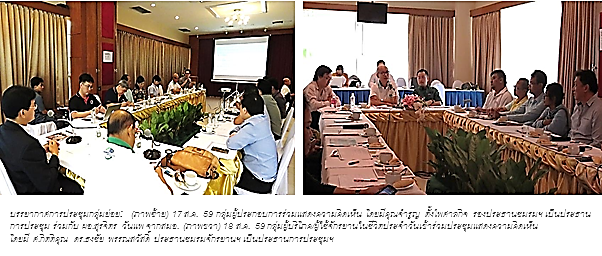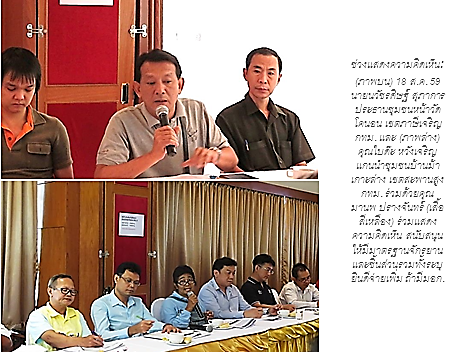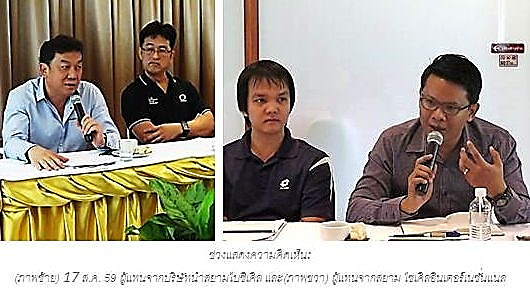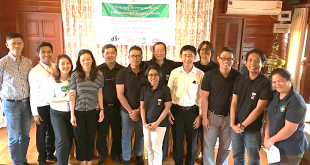Thailand Cycling Club (TCC) and the Industry Ministry’s Thai Industrial Standards Institute (TISI) are in the process of developing drafts of standards for bicycles and bicycle parts in order to improve existing ones issued in 1989, making them consistent with concerned international standards. This improvement would benefit both bicycle-related industry and consumers. On August 17-18, 2016, TCC together with Office of the National Health Commission and Thai Health Promotion Foundation then organised three half-day focus group discussions/consultations at Mido Hotel, Pradiphat Road, in Bangkok, to present the draft and listen to comments and suggestions from three main groups of stakeholder – bicycle manufacturers, consumers/bicycle users and related government agencies. Altogether the three consultations were participated by 74 persons. 
(Left) Discussion in the group of manufacturers on August 17, 2016, was co-chaired by Mr. Chamroon Tangpaisarnkit, TCC Vice President together with Mr. Surajit Wanphae, a Director from TISI. (Right) Discussion in the group of bicycle users was chaired by Prof. Emeritus Thongchai Panswad Ph.D., TCC President.
In summary, all the three groups commonly agreed that there should be Thai standards of bicycles and bicycle parts. However, whether these standards should be general or compulsory ones must be carefully considered as both types of standards have pro and con with differences in details. The pro of compulsory standards is that all bicycles and bicycle parts, both produced domestically and imported ones, must follow certain required standards. All brands of bicycles therefore need to have minimum standards to guarantee safety for users. The con of this kind of standards is that it requires more costs of production, for examples, in terms of raw materials and quality testing equipment; imported bicycles and bicycle parts need to have the standards required by Thailand. When costs of production increased, prices of bicycles and bicycle parts then increased. The pro of general standards is that market prices would be more competitive, resulting in lower prices for bicycles. A major potential con of general standards is that there could be sub-standard bicycles and bicycle parts in the market, resulting in consumers being able to buy bicycles and bicycle parts at low price, but they are not safe for use. Some legal problems could emerge. Three examples were raised. Firstly, enforcement of new standards could be contradictory to existing laws, such as the Land Transport Act in case of back seat for a passenger. Secondly, whether or not small bicycles which are intended to be ‘children toys’ need to follow the new standards. Thirdly, how to deal with cases that bicycles were produced with quality up to the required standards, but consumers change their parts or modify those bicycles themselves and safety problems occur. These cases, and there are more, need to be analysed and discussed further to have definite conclusions. Representatives from groups of consumers in Bangkok who use bicycles in their daily life commonly agreed that they were willing to pay more for bicycles that have product standards certified by Ministry of Industry because they could trust that bicycles they buy have standards and are safe, their materials are in good quality, and their working lifetime is longer than bicycles they could buy nowadays, especially from supermarkets or department stores, at one thousand plus Thai Baht or lower. These cheap bicycles are easily broken and have short working lifetime, not worth even the small amount users pay for. 
Bicycle users group gave their comments: (top) Chairman of Na Wat Khonon community in Phasicharoen District of Bangkok, and (bottom) Ms. Baida Wangcharoen, leader of Baan Ma Koh Lang community in Saphan Soong
Bicycle manufacturers, on the other hand, agreed with having updated standards for bicycles and bicycle parts. They suggested that TISI should work with other related agencies and the mass media to do public relations, disseminating information to retailers and consumers to ensure that they know and understand about these new standards, and a mechanism should be created to enforce implementation of these standards as they would be a measure to prevent imports of sub-standard bicycle products from other countries. They also proposed that Thai entrepreneurs should cooperate more with each other, especially the stronger ones should help weaker ones like brothers/sisters for survival and sustainability of bicycle industry in Thailand. 
Representatives from bicycle manufacturers gave their views: (left) Nam Siam Bicycles Company and (right) Siam Cycle International
In the group of related government agencies, it was explained that testing whether or not bicycles and bicycle parts are up to the set standards is a duty and responsibility of TISI under Ministry of Industry. It has to provide services to test bicycle products, both the whole one and its parts, for entrepreneurs. This test would be in line with the International Standards Organization (ISO). For example, bicycle users must be informed about risks when they use a bicycle, standards for bicycles, and weight that basket, additional back saddle and tires can withstand. The consultations also additionally suggested that when these new standards for bicycles and bicycle parts as industrial product come out, related organisations/agencies, such as Thailand Cycling Club, Foundation for Consumers, and Office of the Consumers Protection Board, should issue a label for bicycles that are up the standards for industrial product similar to the now widely known label for electrical equipment that save electricity in order to create confidence and convenience for consumers when they are going to buy a new bicycle. Moreover, government agencies must be required to buy only bicycles that are up to these standards for industrial product. This requirement would help support Thai small and medium size enterprises, and easier and faster build cycling culture.
 ชมรมจักรยานเพื่อสุขภาพแห่งประเทศไทย ชมรมจักรยานเพื่อสุขภาพแห่งประเทศไทย
ชมรมจักรยานเพื่อสุขภาพแห่งประเทศไทย ชมรมจักรยานเพื่อสุขภาพแห่งประเทศไทย



